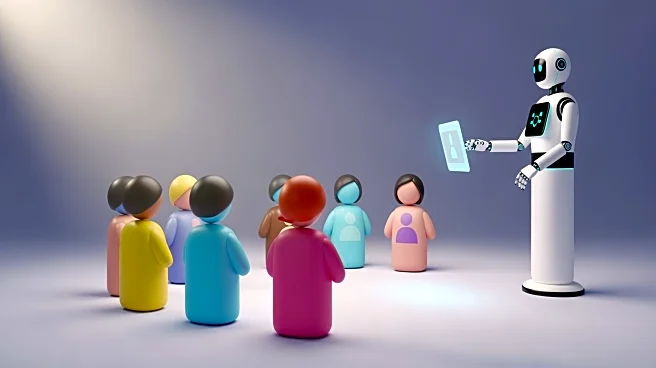What's Happening?
A recent report from Sapia.ai highlights the positive impact of artificial intelligence in the hiring process, challenging the notion that AI is impersonal. The Humanizing Hiring Report, based on feedback
from 1 million job candidates, reveals a preference for AI chat interviews over human recruiters. The report suggests that AI interviews can make the hiring process more personal and equitable, with candidates appreciating the structured, untimed, and text-based format that allows them to express themselves without pressure or bias. The study also indicates that AI-driven interviews promote fairness, with increased participation from women and candidates with disabilities.
Why It's Important?
The integration of AI in hiring processes has significant implications for U.S. industries, particularly in human resources and recruitment. By enhancing fairness and reducing bias, AI interviews can lead to more diverse and inclusive workplaces. This shift could improve brand perception and candidate experience, which are crucial for long-term employee retention and engagement. Companies that adopt AI-driven hiring practices may gain a competitive edge by attracting a broader talent pool and fostering a positive employer reputation. The findings underscore the importance of transparency and responsible AI design in maintaining trust and human connection in recruitment.
What's Next?
As AI continues to evolve, HR leaders are encouraged to audit their hiring processes for accessibility and fairness. This includes removing barriers like timed tests and video interviews, and ensuring data-driven assessments are transparent. Organizations may increasingly treat candidate experience as a measurable business outcome, linking it to retention and engagement metrics. The ongoing development of AI technology will likely lead to further innovations in recruitment, with potential for more personalized and efficient hiring processes. Stakeholders will need to balance AI's capabilities with human oversight to maintain ethical standards and trust.
Beyond the Headlines
The use of AI in hiring raises ethical considerations regarding data privacy and the potential for algorithmic bias. Companies must ensure that AI systems are designed responsibly, with safeguards to protect candidate information and prevent discrimination. The shift towards AI-driven recruitment also reflects broader cultural changes in the workplace, emphasizing the importance of diversity, equity, and inclusion. As AI technology becomes more prevalent, it may influence societal perceptions of fairness and transparency in employment practices, prompting discussions on the role of technology in shaping the future of work.









